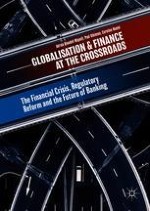2018 | OriginalPaper | Buchkapitel
2. Financial Innovation and Basel II
verfasst von : Adrian Blundell-Wignall, Paul Atkinson, Caroline Roulet
Erschienen in: Globalisation and Finance at the Crossroads
Aktivieren Sie unsere intelligente Suche, um passende Fachinhalte oder Patente zu finden.
Wählen Sie Textabschnitte aus um mit Künstlicher Intelligenz passenden Patente zu finden. powered by
Markieren Sie Textabschnitte, um KI-gestützt weitere passende Inhalte zu finden. powered by
